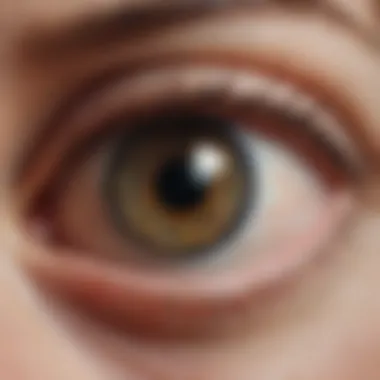Understanding Itching Eyes After Cataract Surgery


Intro
Cataract surgery is a common optical procedure that has improved countless lives by restoring vision. However, many patients experience unexpected symptoms during their recovery, one of which is itching eyes. Understanding why this occurs can be crucial for proper post-operative care. This article aims to clarify the phenomenon of itching eyes after such surgeries. Through exploring potential causes, expected duration, and effective treatments, the narrative will shed light on what patients may anticipate during their recovery process. The insights provided here serve to inform both patients and healthcare professionals about this common issue, offering practical solutions where needed.
Key Concepts and Terminology
Definition of Key Terms
- Cataract Surgery: A procedure to remove the clouded lens of the eye, typically replaced with an artificial lens.
- Post-operative Recovery: The healing process that occurs following surgery, involving various symptoms including itching, redness, and discomfort.
- Eyelid Health: Pertains to the overall condition of the eyelids, which can impact eye comfort and health.
Concepts Explored in the Article
The article will discuss several significant concepts:
- The physiological response of the eyes during healing
- Potential irritants or complications leading to itching
- Treatment options available for managing itching eyes
- The timeline for recovery and when to consult a medical professional
Findings and Discussion
Main Findings
Research indicates that itching eyes after cataract surgery can stem from multiple factors. Common reasons include:
- Dryness: Post-surgical eyes may not retain moisture as effectively, leading to dryness and irritation.
- Inflammation: Healing tissues can cause mild inflammation, resulting in a sensation of itchiness.
- Allergic Reactions: Some patients may experience allergies to eye drops or materials used during surgery.
These findings suggest that while itching can be a normal part of recovery, it should not be ignored. In most cases, it subsides within a few weeks. However, persistent itching may warrant further investigation.
Potential Areas for Future Research
There is an ongoing need for research focused on specific interventions that effectively alleviate itching. Studies could delve into comparative effectiveness of various treatment options. Understanding how different patient factors—like age, underlying health conditions, or specific ocular anatomy—affect post-surgical recovery could be valuable in developing tailored strategies for managing symptoms.
Research into the long-term effects of different surgical techniques on post-operative symptoms like itching will advance our understanding of eye health and recovery.
By systematically addressing these dimensions, the article provides a roadmap for recognizing and managing itching eyes following cataract surgery.
Preface to Cataract Surgery
Cataract surgery is a common procedure that addresses the clouding of the eye's natural lens, which can lead to visual impairment. Understanding this surgical intervention is essential, especially for individuals who may undergo it. This section provides a foundation to comprehend the complexities of cataract surgery and sets the stage for discussing related symptoms, such as itching eyes.
Definition of Cataract Surgery
Cataract surgery involves the removal of the cloudy lens of the eye and replacing it with an artificial lens. The procedure is typically performed on an outpatient basis, meaning that patients can go home the same day. The surgery aims to restore clear vision, which can significantly enhance one’s quality of life. Modern techniques, such as phacoemulsification, use ultrasound waves to break up the cataract before its removal. This minimally invasive approach reduces recovery time and improves outcomes.
Common Post-Surgical Symptoms
After cataract surgery, patients may experience various symptoms as part of the normal healing process. These can include:
- Blurred Vision: This may occur as the eye adjusts to the new lens.
- Light Sensitivity: Increased sensitivity to light can be common after surgery.
- Dryness or Discomfort: Some may feel a foreign body sensation which can be unsettling.
- Itching: Several factors can contribute to this feeling.
While most symptoms are temporary and expected during recovery, persistent or severe discomfort may warrant further evaluation. It is crucial to differentiate between typical post-surgical effects and symptoms that could indicate complications. Understanding these symptoms helps patients navigate their recovery journey and recognize when to seek medical guidance, thereby ensuring a smooth recuperation process.
Understanding Itching Eyes
Itching eyes after cataract surgery is a common concern among patients. Understanding this symptom is crucial for anyone who has undergone the procedure. Awareness of why itching occurs can alleviate anxiety and ensure a smoother recovery process. The sensation can arise from various factors, including inflammation, dryness, or exposure to environmental irritants. By recognizing these causes, patients can better manage their discomfort and seek appropriate remedies.
The emotional impact of itching eyes should not be underestimated. Such discomfort can affect daily life, prompting questions about the healing process and potential complications. On the one hand, understanding itching sensations provides assurance. On the other hand, it prompts timely action if symptoms become concerning.
This article aims to clarify the origins of this sensation while offering guidance on when to take further action. As patients gain knowledge, they can feel empowered in their recovery journey and maintain better communication with their healthcare providers.


What Causes Itching Sensation?
The itching sensation often stems from several biological and environmental factors. One primary cause is the body’s inflammatory response following surgery. The procedure can irritate the eyes, leading to a need for the body to heal itself. This natural reaction can trigger itching, as nerve endings in the eyes are stimulated.
Additionally, dryness is another significant factor. Cataract surgery may affect tear production temporarily, making the eyes feel uncomfortable. A lack of sufficient moisture can lead to sensations of itching and irritation, prompting an urge to rub the eyes, which can worsen the problem.
Environmental factors also contribute to this symptom. Dust, pollen, and smoke in the air can aggravate sensitive eyes post-surgery. Exposure to bright lights or screens may also play a role, causing discomfort and leading to itching.
Differentiating Between Normal and Abnormal Itching
Understanding the difference between normal and abnormal itching is vital for patients. Normal itching typically presents as a mild, transient discomfort. It often occurs in the weeks following the surgery and diminishes as healing progresses. Patients can usually manage this sensation with self-care measures, such as over-the-counter moisturizing eye drops.
However, abnormal itching can signal a more serious issue. Symptoms that require professional attention may include:
- Persistent or worsening itching
- Accompanying redness or swelling
- Discharge from the eye
- Sensitivity to light or vision changes
If patients notice any of these signs, it is essential to consult an eye care professional. Early intervention can prevent complications and protect the overall health of the eyes. Recognizing the difference can lead to better management of one’s post-surgery experience.
The Role of Inflammation
Inflammation plays a critical role in the body’s healing process after cataract surgery. This physiological response is both normal and necessary, allowing the body to recover from surgical trauma. However, it can also contribute to discomfort, including itching eyes. Understanding inflammation's function provides valuable insights into post-surgical recovery, so patients can better manage their symptoms and expectations.
Inflammatory Response Post-Surgery
After cataract surgery, patients may experience a variety of inflammatory symptoms. These can include redness, swelling, and, notably, itching. The body's immune system reacts to the surgical intervention, which is interpreted as an injury. This reaction brings white blood cells and other substances to the eye area. Here are a few key points about the inflammatory response:
- Normal Response: Inflammation is expected post-operatively, typically indicating that healing is underway.
- Duration: Symptoms usually develop within a few days and can last several weeks, depending on the individual's recovery process.
- Symptoms: Common features include mild discomfort and visual disturbances alongside itching.
While some level of inflammation is normal, excessive inflammation can lead to complications, making it essential for patients to observe their symptoms closely.
Preventing Inflammation-Related Issues
To mitigate potential problems related to inflammation post-surgery, several strategies can be employed. Patients should consider the following recommendations:
- Medication Adherence: Follow the prescribed regimen of anti-inflammatory eye drops without skipping doses.
- Avoid Irritants: Stay away from smoke, dust, and strong chemicals that can aggravate the eyes.
- Keep Eye Clean: Maintain a clean eye area, gently washing the skin around the eyes to prevent infection.
- Avoid Rubbing: Refrain from touching or rubbing the eyes, which can introduce bacteria and exacerbate inflammation.
- Wear Sunglasses: Protect your eyes from bright light and UV exposure after surgery, which can contribute to discomfort.
By actively managing inflammation, patients can improve their recovery experience and reduce the risk of complications. As a result, understanding the inflammatory response becomes a vital part of postoperative care that every patient should prioritize.
Exposure and Irritants
The topic of exposure and irritants holds significant importance in the context of post-cataract surgery recovery. Itching eyes can arise from several factors, especially in the days and weeks following the operation. Understanding these factors is vital for both patients and practitioners. Addressing environmental irritants and ensuring proper eye protection are crucial steps in minimizing discomfort and promoting healing.
Environmental Factors Contributing to Itchiness
Environmental factors can intensify the itching sensation experienced after cataract surgery. Some common irritants include:
- Dust and Allergens: Exposure to dust, pollen, or pet dander may trigger an allergic reaction, causing inflammation and itchiness.
- Chemical Irritants: Household cleaners, perfumes, or smoke can irritate sensitive eyes, making them itch even more.
- Dry Air: Low humidity levels, especially in heated or air-conditioned environments, can lead to dryness and discomfort in the eyes.
Patients should be mindful of their surroundings. Maintaining a clean living space can help reduce exposure to allergens. Using an air purifier may also be beneficial for improving air quality indoors. Moreover, reducing exposure to harsh chemicals can minimize the risk of irritation.
Regularly cleaning one's home and using hypoallergenic products can significantly reduce irritants that might provoke itching post-surgery.
Importance of Eye Protection After Surgery
Eye protection after cataract surgery is paramount. It can help mitigate exposure to harmful elements that may exacerbate itching and other symptoms. Patients should consider these protective measures:
- Sunglasses: Wearing sunglasses shields the eyes from bright light and harmful UV rays, which can be bothersome during recovery. They also provide a barrier against dust and wind.
- Protective Eyewear: Safety glasses can be advantageous when engaging in activities that might expose the eyes to environmental hazards.
- Avoid Rubbing Eyes: Patients need to refrain from touching or rubbing their eyes, as this can introduce bacteria and increase the risk of irritation or infection.


Taking these protective measures is essential for ensuring a smooth recovery. Eye care during the initial healing period can set the stage for better long-term outcomes.
Duration of Symptoms
Understanding the duration of symptoms such as itching eyes after cataract surgery is crucial for both patients and healthcare practitioners. This information not only helps in setting realistic expectations during recovery but also guides the patient in distinguishing normal discomfort from potential complications. The timeline for symptom resolution can provide valuable insights into the healing process.
Typical Recovery Timeline
Post-operative recovery from cataract surgery varies among individuals but typically follows a general timeline. Most patients may experience some level of itching or discomfort in the immediate days following the procedure. Usually, this period lasts around three to seven days. Itching often reduces as the eyes begin to heal and adapt.
In the first 24 hours, patients should be cautious about eye hygiene and avoid rubbing the eyes. By day three to five, many start to notice a significant improvement in symptoms.
It can be helpful for patients to track their symptoms. A log noting the type and severity of itching, as well as additional symptoms, can provide valuable insights. This information can be useful for follow-up appointments as well.
When to Expect Improvement
The expectation of improvement varies. While some might feel relief within a week, others may take up to a month to notice significant changes. Factors influencing this range include the individual’s overall health, the presence of other eye conditions, and adherence to post-operative care instructions.
It is also important to recognize signs that accompany the itching. If the itching is persistent and worsens or is accompanied by redness, swelling, or any discharge, it is advisable to seek medical assistance immediately. This can help prevent complications.
The duration of itching eyes after cataract surgery is typically temporary. However, understanding and monitoring this symptom can greatly affect recovery satisfaction.
In summary, while itching post-cataract surgery is common, its duration can vary. Recognizing when to expect improvement can help patients navigate their recovery effectively.
Managing Itching Eyes
Managing itching eyes after cataract surgery is essential for facilitating a smooth recovery. This symptom can be uncomfortable and may disrupt daily activities. Understanding how to cope with this sensation can alleviate anxiety and improve overall satisfaction with the surgical outcome. It's crucial to identify appropriate remedies, both at home and through medication, to tackle the itchiness effectively, preventing potential complications.
Recommended Home Remedies
When dealing with itching eyes, several home remedies can provide relief. It's important to approach these remedies with caution. Here are some suggestions:
- Cold Compress: Applying a clean, cold compress to closed eyes can reduce swelling and soothe irritation. Make sure to use a soft cloth and avoid direct pressure.
- Artificial Tears: These over-the-counter drops can help lubricate the eyes and wash away allergens or irritants that may cause itching.
- Warm Water Rinses: Gently rinsing your eyes with warm water may provide comfort. Ensure that the water is not too hot to avoid further irritation.
- Avoid Rubbing: While it may be tempting to rub itchy eyes, this can worsen irritation. Encourage gentle tapping or dabbing instead.
- Hydration: Staying hydrated by drinking water supports overall eye health and may reduce dryness, which contributes to itching.
Medications and Treatments
In some cases, home remedies may not suffice. If itching continues, consult a healthcare provider for medications and treatments that may be necessary. Various options are available:
- Antihistamines: Oral or topical antihistamines can effectively address itching caused by allergic reactions. These medications block histamine, a substance that contributes to allergic responses.
- Prescription Eye Drops: In more severe cases, a doctor may prescribe specific eye drops that reduce inflammation or treat more serious underlying issues.
- Corticosteroids: These may be recommended for short-term use to alleviate significant inflammation. However, they require careful monitoring due to potential side effects.
- Follow-Up Procedures: If itching persists despite treatment, additional consultations may be necessary. It’s important to rule out any complications related to the cataract surgery itself.
Managing itching eyes effectively is crucial to ensuring a positive recovery experience. Take the time to understand and implement both home remedies and prescribed treatments to remain comfortable during recovery.
Potential Complications
Understanding potential complications after cataract surgery is crucial for postoperative care. Recognizing these issues can directly influence the recovery experience of the patient. While itching eyes may seem mundane, it can signal more serious underlying problems. Addressing these symptoms proactively can promote better healing outcomes.
Identifying Serious Issues
It is paramount to differentiate between normal post-surgical reactions and signs of complications. Serious issues that may arise after cataract surgery include:
- Infection: Symptoms may include increased redness, swelling, and discharge. If itching is accompanied by these signs, it warrants immediate medical attention.
- Inflammation: If the itching persists and is severe, it may indicate inflammation beyond the expected range. Medicated eye drops usually help, but persistent issues should be evaluated by an ophthalmologist.
- Corneal Edema: This condition can lead to blurred vision and discomfort. Patients may experience an abnormal level of itching and discomfort, suggesting a need for further assessment.
By understanding these concerns, patients can make informed decisions and seek timely intervention.
Implications of Untreated Symptoms
Failing to address untreated symptoms can result in a deterioration of eye health. Some implications include:


- Chronic Discomfort: If itching is left unaddressed, it can lead to consistent irritation, disrupting daily activities and impacting quality of life.
- Risk of Vision Loss: Infections or complications not handled properly can lead to irreversible damage. Vision impairment is a potential risk if serious issues go unnoticed.
- Increased Healthcare Costs: What may start as untreated itching could escalate into larger health problems, necessitating more extensive treatments, which could incur higher costs for patients.
Regularly monitoring symptoms post-surgery is essential for preventing complications and ensuring optimal recovery.
Professional Consultations
Professional consultations are a critical aspect of the recovery process after cataract surgery. Understanding when to seek help and how to prepare for follow-up appointments can significantly impact the outcomes of surgical interventions. This section emphasizes the importance of professional consultations, detailing specific benefits and considerations that arise in the context of post-surgery care.
First and foremost, it is essential to recognize that each patient’s recovery journey is unique. After surgery, changes in vision and the experience of symptoms like itching may vary widely. Consulting healthcare professionals assures patients receive personalized guidance tailored to their specific condition and needs. This can provide reassurance and clarity regarding any abnormalities experienced during recovery.
Furthermore, regular follow-up appointments enable the surgeon to monitor the healing process and identify any potential complications early on. Conditions like infection, inflammation, or other anomalies can be detected through clinical assessments. Early detection often leads to better management and improved outcomes. For patients, knowing when to reach out for help can make a considerable difference in maintaining eye health post-surgery.
Timely professional consultations are essential to ensuring a successful recovery.
Additionally, professional expertise is crucial in managing medications prescribed for itching or discomfort. Healthcare providers can recommend suitable eye drops or other medications, explaining the anticipated timeline for symptom relief and what patients should expect. Appropriate guidance prevents misuse of over-the-counter remedies that may exacerbate irritation or delay healing.
When to Contact Your Surgeon
Patients should contact their surgeon under various circumstances. Key indicators that suggest a need for immediate communication include:
- Severe Itching: If itching becomes unbearable or is accompanied by redness and swelling, it’s important to seek help.
- Vision Changes: Sudden or significant changes in vision, like blurriness or flashes of light, should be addressed promptly.
- Discharge: If there is any unusual discharge from the eye, this could indicate an infection that requires urgent attention.
- Pain: Intense or worsening pain that doesn’t subside may indicate complications.
Understanding these warning signs is essential for patients. By staying vigilant, they can protect their eye health and address issues promptly, ensuring a smoother recovery process.
Preparing for Your Follow-Up Appointment
Preparation for follow-up appointments can enhance the effectiveness of consultations and ensure that all pertinent issues are addressed. Here are several steps patients can take:
- List Symptoms: Documenting all symptoms experienced since surgery can help inform the healthcare provider accurately.
- Medication Review: Gather information about any medications taken, including dosages and frequency.
- Questions Ready: Patients should formulate questions beforehand to clarify any doubts regarding their recovery or treatment plan.
- Schedule in Advance: Booking follow-up appointments promptly post-surgery ensures timely care and reduces anxiety related to monitoring recovery.
Taking these steps can facilitate a productive discussion with the surgeon, ultimately leading to better management of one’s eye health post-cataract surgery.
Long-Term Eye Care After Surgery
Long-term eye care after cataract surgery is crucial for ensuring optimal visual outcomes and maintaining eye health. Patients often focus on the immediate post-operative period, but neglecting ongoing care can lead to complications or diminished visual quality. Understanding the components of effective long-term eye care fosters better recovery and enhances overall satisfaction with the surgical results.
Establishing a Postoperative Care Routine
Establishing a robust postoperative care routine is essential. This routine should include the following elements:
- Follow Prescribed Medications: Use eye drops and medications exactly as your surgeon prescribes. Missing doses can slow healing and increase discomfort.
- Monitoring Symptoms: Keep a diary of your symptoms, noting any changes in vision or discomfort. This record can be invaluable during follow-up appointments.
- Hygiene Practices: Maintain hygiene by gently cleaning the eye area and avoiding eye rubbings. This is important in preventing infections which are more likely after surgery.
- Limiting Strain: Activities such as reading or using screens may need to be moderated. Too much strain can lead to irritation and do not provide an environment conducive to healing.
A well-structured routine assists in the healing process and promotes patience during recovery. Consistency is key. Focus on your prescribed timeline, and do not hesitate to communicate with your doctor if you experience unusual symptoms.
Regular Eye Exam Importance
Regular eye exams following cataract surgery play a pivotal role in long-term care. Here are some important points:
- Tracking Healing Progress: Routine exams allow your eye doctor to monitor healing and identify any issues early. Early detection is crucial for successful interventions.
- Adjusting Prescriptions: You may need changes in glasses or contact prescriptions. Regular visits ensure that your vision remains clear, and adjustments happen in a timely manner.
- Preventative Care: Comprehensive eye examinations can identify potential complications, such as cataracts returning or other ocular conditions.
- Eye Health Education: During these exams, you can learn about maintaining eye health long term, including nutrition, lifestyle, and protective measures against injuries.
Regular eye care is not just about recovery. It sets a foundation for lifelong eye health.
Epilogue
In this article, we have thoroughly explored various aspects regarding itching eyes after cataract surgery. Understanding why this symptom occurs is vital for patients navigating their recovery. The sensation of itching, while often benign, can reveal underlying issues that may require attention. This emphasizes the importance of distinguishing between normal postoperative symptoms and those that might indicate complications.
Summary of Key Points
- Itching eyes commonly occur post-cataract surgery and may stem from inflammation, dry eyes, or exposure to irritants.
- Recognizing the difference between normal and abnormal itching can aid in determining whether further consultation is necessary.
- Effective management strategies include home remedies and prescribed medications to alleviate discomfort.
- Patients should always monitor symptoms and maintain communication with their healthcare providers to ensure a smooth recovery.
Encouragement for Patients
Post-surgery recovery can feel daunting but understanding symptoms like itching eyes is an essential part of the healing process. Remember that asking questions and voicing concerns can lead to better support and care. If itching persists or worsens, do not hesitate to reach out to your surgeon for clarity and guidance. Ensuring the health of your eyes is paramount, and being proactive in your care can lead to successful outcomes.







